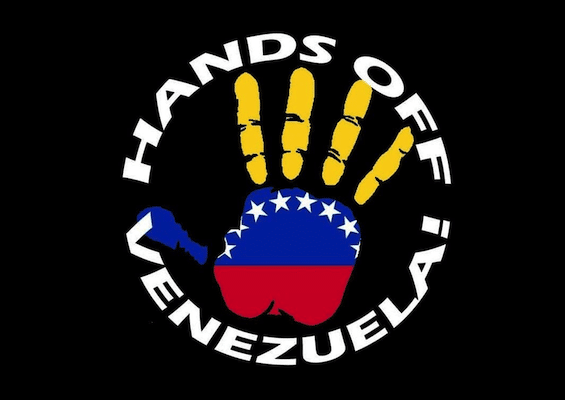Dear friends,
Greetings from the desk of Tricontinental: Institute for Social Research.
No country should go through what Venezuela has been going through since 2017.
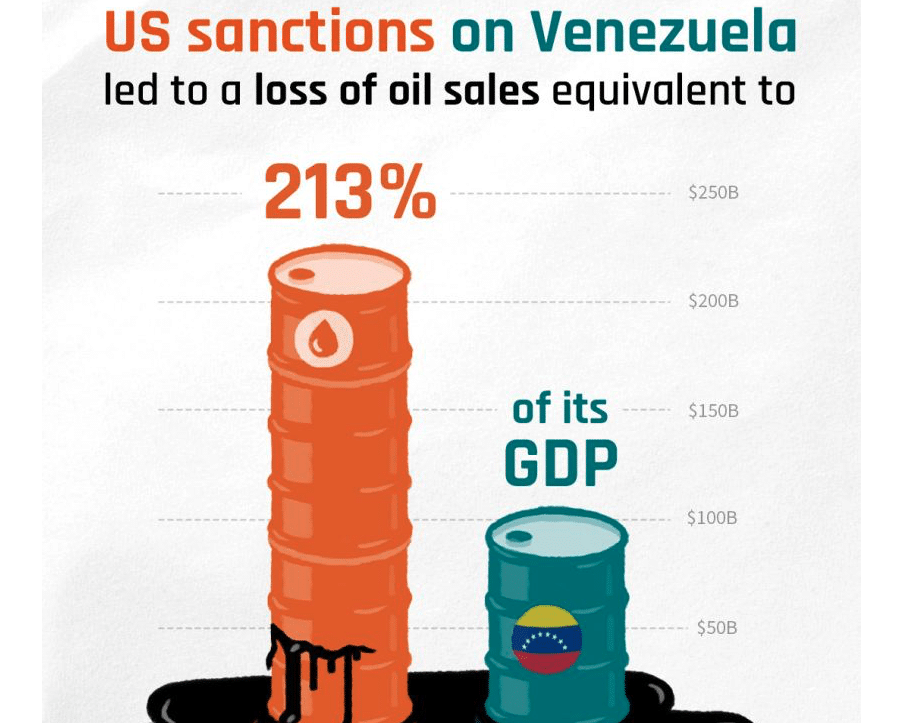
The FACTS graphic above shows that U.S.-led sanctions (more aptly referred to as Unilateral Coercive Measures, or UCMs) caused Venezuela to lose oil revenue equivalent to 213% of its GDP between January 2017 and December 2024. In total, the country suffered an estimated $226 billion in losses—around $77 million per day—during this period. This data, produced by Global South Insights and Tricontinental based on research by Venezuelan economist Yosmer Arellán, was calculated by comparing actual figures with an estimate of Venezuelan oil production without the maximum pressure campaign initiated by U.S. President Donald Trump.
Before 2017, Venezuela relied on its oil revenue for 95% of its export earnings. Moreover, oil revenue has been critical for financing the government’s progressive social agenda. This loss has caused inflation in Venezuela to soar: according to official Central Bank of Venezuela numbers from 2019, the highest inter-annual inflation rate was 344,510%, meaning prices increased by a factor of 3,400 in a single year. This is an unimaginable disaster for any country and an enormous strain on the population.
While Venezuela has been under attack by the U.S. government and its allies since Hugo Chávez’s first election in 1998, Trump’s 2017 Executive Order 13808 set off a new wave of financial sanctions that denied Venezuela access to international credit markets, severely undermining its ability to sell oil abroad. What the executive order did was prevent any U.S. national from buying new debt from the Venezuelan government or purchasing existing bonds that would have enabled refinancing. Dividend payments from Citgo (the U.S. subsidiary of the Venezuelan national oil company Petróleos de Venezuela, S.A., or PDVSA) were halted later, in January 2019, when the company was seized and placed under the control of Juan Guaidó, the person imposed on the country as its ‘president’ by the United States. This prevented PDVSA from securing letters of credit to guarantee oil shipments, finding insurance for oil tankers, maintaining oil fields, and conducting transactions with non-US nationals who feared secondary sanctions. Two additional executive orders imposed by Trump (13850, on 1 November 2018, and 13857, on 25 January 2019) further restricted Venezuela’s access to financing and targeted buyers of its oil, particularly in Europe and India.
Trump took the Venezuelan economy by the throat and squeezed as hard as he could.
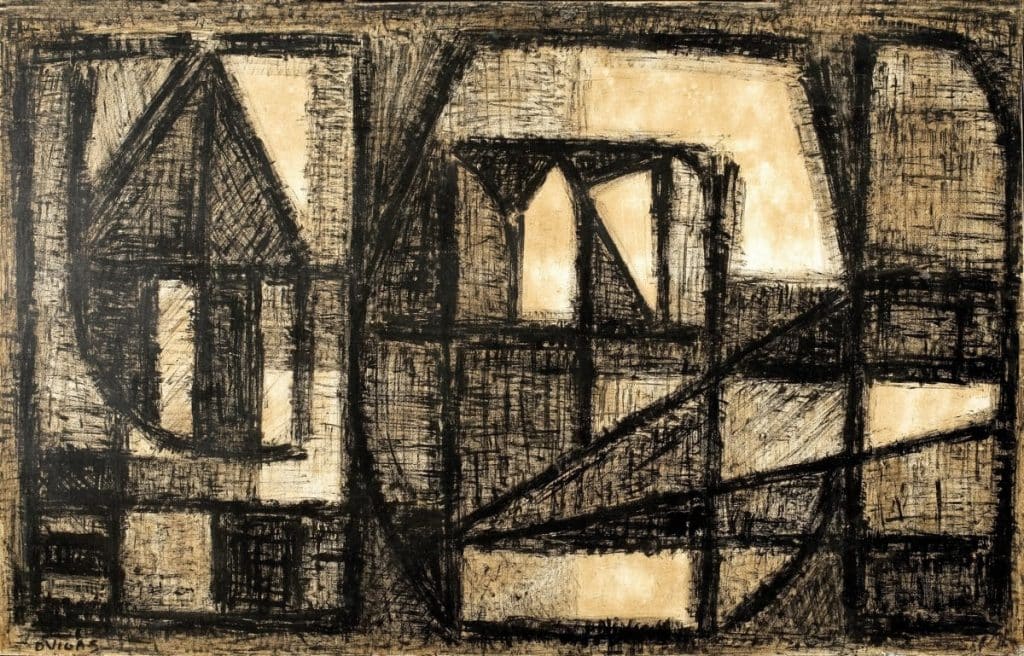
Oswaldo Vigas (Venezuela), Objeto negro americano en tres bloques (American Black Object in Three Blocks), 1956.
The horrendous impact of the executive orders was immediately clear to the Trump administration. On 11 March 2019, Matt Lee of the Associated Press asked then U.S. Secretary of State Mike Pompeo about the UCM-driven humanitarian crisis in Venezuela. Pompeo’s answer was direct:
The circle is tightening. The humanitarian crisis is increasing by the hour. I talked with our senior person on the ground there in Venezuela last night at 7:00 or 8:00 last night. You can see the increasing pain and suffering that the Venezuelan people are suffering from.
This ‘pain and suffering’ was felt by the real target of the UCMs: the Venezuelan people. Two years later, Alena Douhan, the UN special rapporteur on the negative impact of unilateral coercive measures on the enjoyment of human rights, visited Venezuela and filed a report for the UN Human Rights Council. What Douhan found was catastrophic: the 2014 oil crash triggered widespread food and medicine shortages, which were compounded by Trump’s maximum pressure campaign beginning in 2017. This crisis was a sharp contrast from the significantly raised living standards that the population had enjoyed since the Bolivarian Revolution in 1998. As Douhan wrote, ‘the tightening of sanctions from 2017 undermined the positive impact of the multiple reforms and the State’s capacity to maintain infrastructure and continue to implement social programmes’. Importantly, she explained that ‘existing humanitarian exemptions are ineffective and insufficient, subject to lengthy and costly procedures, and do not cover the delivery of spare parts or equipment and machinery indispensable for the maintenance and restoration of the economy and vital public services’. That means that the entire UCM regime—despite exemptions—forced the Venezuelan people to pay a heavy cost, as we show in our recent dossier Imperialist War and Feminist Resistance in the Global South.
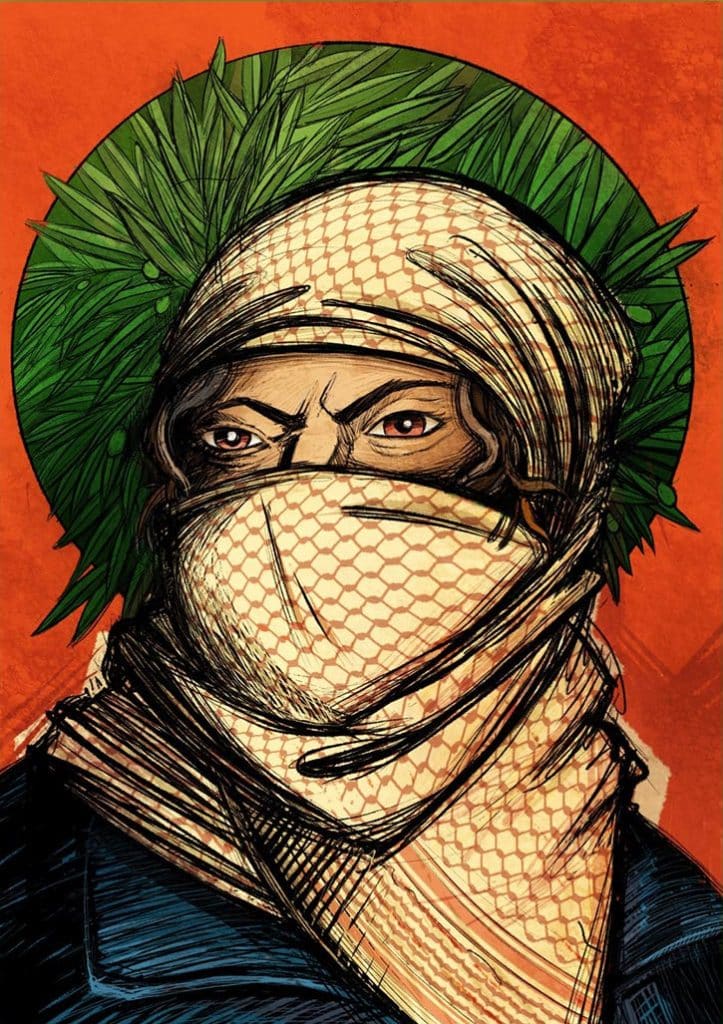
Pablo Kalaka (Venezuela), Olivos y resistencia (Olive Trees and Resistance), 2024.
Contrary to the narrative pushed by people like Trump and Pompeo, there is no way that mismanagement and corruption could have caused this level of economic devastation in just seven years (2017—2024). Everyone who has looked seriously at the Venezuelan economy has noted that the fiasco is entirely driven by the Trump administration’s intensification of UCMs from 2017 onwards.
At that time, Trump’s Latin America team was comprised of people such as Mauricio Claver-Carone, a Cuban American lawyer and the senior director for Western Hemisphere Affairs in the National Security Council. Claver-Carone was regarded as the author of Trump’s ‘maximum pressure’ campaign against Venezuela, and, according to senior officials in the U.S. State Department, he even wrote Trump’s executive orders. After a scandal at the Inter-American Development Bank, he is now Trump’s special envoy for Latin America. His aim is to overthrow both the Cuban and Bolivarian revolutions by any and every means.
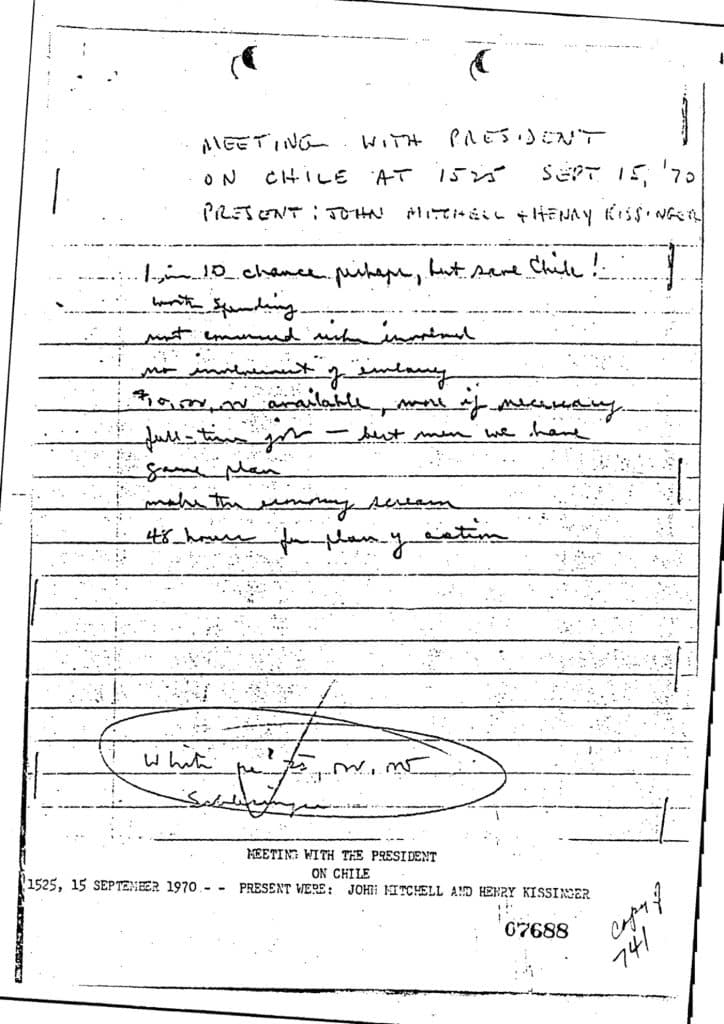
CIA Director Richard Helms’ notes during a meeting with U.S. President Richard Nixon about Chile at 15:25 on 15 September 1970, with John Mitchell and Henry Kissinger present.
In April 1976, the United States Senate Select Committee to Study Governmental Operations with Respect to Intelligence Activities, chaired by Senator Frank Church, published its final report. The select committee’s staff report, Covert Action in Chile, 1963—1973, compiled documents on the destabilisation of President Salvador Allende’s government. It includes a handwritten note by CIA Director Richard Helms about a 15 September 1970 meeting in the White House with President Richard Nixon, Attorney General John Mitchell, and National Security Advisor Henry Kissinger. The meeting took place eleven days after Allende, of the Socialist Party of Chile, won the presidency. Nixon advised his team to ‘save Chile’ by putting the ‘best men we have’ on the job. The game plan: ‘make the economy scream’.
A few weeks after the meeting, on 9 November, Kissinger filed National Security Decision Directive Memorandum 93, which laid out this ‘game plan’. With a ‘correct but cool’ public posture, Kissinger wrote, the U.S. must apply maximum pressure to prevent Chile from accessing any further finances, including access to international banks and multilateral financial institutions as well as private U.S. businesses. In the aftermath of Chile’s nationalisation of its copper industry, U.S. multinational mining companies—such as Kennecott—sought to intercept Chilean ships and seize their copper or prevent the country from selling copper to third parties, including European countries. The U.S. used its power over the International Monetary Fund (IMF) to deny loans and pressured international bodies to stop Chile from initiating arbitration proceedings over legal challenges to its mines. Shipping companies began to avoid Chile, and the country’s copper exports became less attractive to buyers. A decline in the price and volume of copper exports—which had accounted for 80% of Chile’s foreign exchange—severely impacted the economy. This decline led to a general economic crisis, with shortages of imported goods and industrial supplies as well as an inflation rate that soared to 200% in 1973.
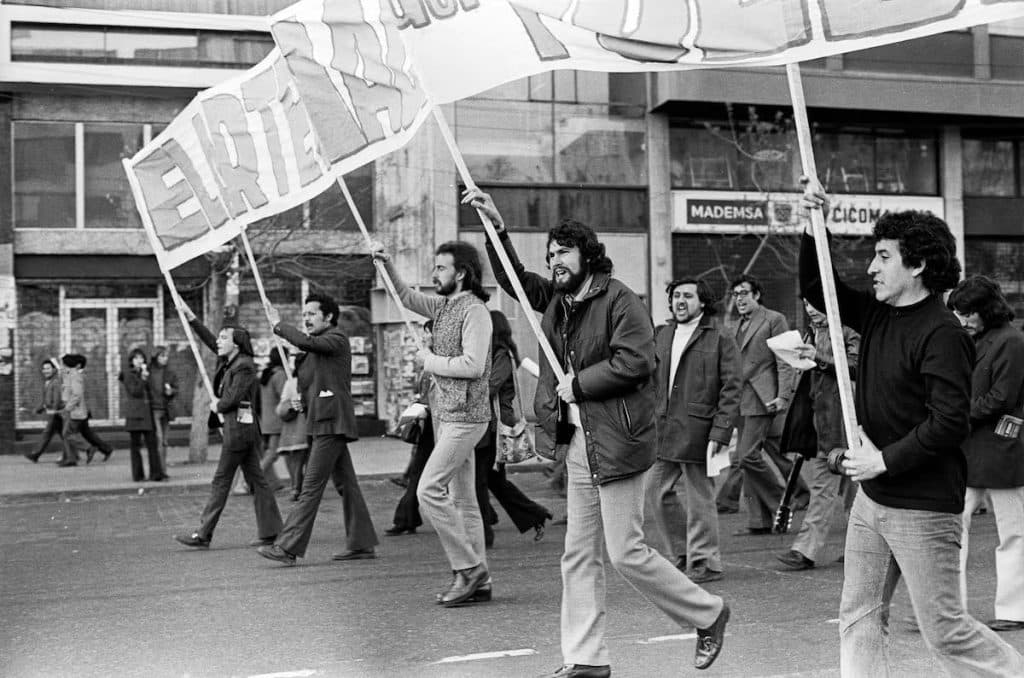
A week before the coup, Victor Jara (pictured on the far right) marches for peace and development, 1973.
In our September 2023 dossier The Coup Against the Third World: Chile, 1973, we show how the coup against Allende’s government was in fact a coup against any attempt by Third World countries to exercise sovereignty over their raw materials and build a socialist economy with those gains. Exactly the same motives are evident in the case of Venezuela. In February 2019, Trump gave a speech in Miami about Cuba, Nicaragua, Venezuela, and socialism in which he declared that ‘the twilight hour of socialism has arrived in our hemisphere’. Trump was referring not only to Latin America but also to the United States, which, he insisted, ‘will never be a socialist country’.
What the United States did to Chile between 1970 and 1973 is precisely what they have been doing to Venezuela since at least 2017. In 1972, Victor Jara captured the sensibility of the economic war on Chile and the essence of Chilean resistance to that war with his song El hombre es un creador (Man Is a Creator). It is a simple song about the working class in the factories and fields and underneath the earth in the mines. The last stanza is powerful:
| Aprendí el vocabulario del amo, dueño y patrón, me mataron tantas veces por levantarles la voz, pero del suelo me paro, porque me prestan las manos, porque ahora no estoy solo, porque ahora somos tantos. |
I learned the language of my masters, owners, and bosses They killed me so many times for raising my voice at them, but from the ground I get up, because I am lent a hand, because now I’m not alone, because now we are many. |
Victor Jara was tortured and killed in the coup that overthrew Allende. His grave in Santiago is a place of pilgrimage for dreamers and dreams. Dreams are worthy: they give us hope. Dreams are better than the bitterness of men like Nixon and Trump, Kissinger and Claver-Carone.
Warmly,
Vijay

